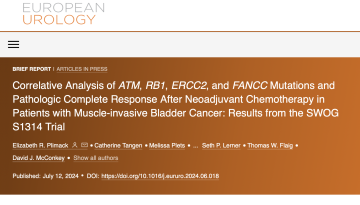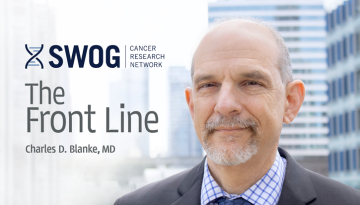Hope Is SWOG's Tomorrow
What does The Hope Foundation mean to you? From my perspective, support from the foundation enables SWOG’s future success. Our grants largely fund today’s operations and a bit of planning – Hope invests in innovation and in our tomorrow.
Hope’s report last month to SWOG’s board of governors was mostly reassuring, describing a foundation that continues to support a broad portfolio of ongoing SWOG programs and to fund news ones as opportunities arise.
But member engagement with the foundation has suffered under COVID. Virtual group meetings don’t connect our community as deeply as in-person meetings, and the fact that our last four group meetings have been conducted online means donations to Hope have fallen off (have you given yet this year?).
Donation totals fluctuate from year to year, and the Hope board of directors and staff plan for this, so even in a cycle of reduced contributions, Hope Foundation support for SWOG continues undiminished ($3.2 million in direct funds are budgeted for 2022).
Still, member support for Hope is crucial if Hope is to continue to support SWOG. So maybe what we need is a brief reminder of just how many ways the foundation sustains the group and its members – a not insignificant list!
Career development support, like the Career Engagement Award and Coltman Fellowship, giving researchers at various career stages protected research time; the Young Investigator Training Course and Virtual Grant Writing Workshop, to help early career researchers develop studies and win grants; and the John Crowley, PhD, Award, to nurture promising biostatisticians.
Research support, such as the SWOG Early Exploration and Development (SEED) Fund awards and SWOG/Hope Impact Awards, both of which underwrite the early stages of innovative research; SWOG Trial Support (STRS) Awards and Trial-Specific Education Funds, to assist with ongoing clinical trials; and Secondary Data Analysis awards, for projects that mine SWOG’s vast trials database.
Community support, which includes the VA Integration Support Program to help VA medical centers open NCTN trials, Special Recognition Awards to honor outstanding members for dedicated service, Committee Group Meeting Funds to provide for committee session needs, and the CRA/Nurse Travel Support and Board of Governors Travel Support programs to ensure those members can make it to our group meetings.
And much more, including underwriting pretty much all of SWOG’s growing portfolio of efforts to enhance diversity, equity, and inclusion in our leadership, membership, and clinical trials, and providing primary support for the SWOG Latin America Initiative.
Hope regularly adds new programs to this list (like a recently approved large project to get advanced practice providers more involved in SWOG research) and, to ensure emerging needs are met, it issues a group-wide open call each summer to fund novel ideas.
Finally, in addition to the public-facing grants and awards, Hope also sustains SWOG in less visible but no less vital ways, serving as administrative home to SWOG’s Operations Office and the SWOG Clinical Trials Partnerships (CTP) program, and providing crucial funds for many administrative components of SWOG group meetings, for example.
Hope’s support of SWOG actually takes my breath away. To ensure we have the cutting-edge trials, the expert clinical trialists, and the seasoned leaders we need for the coming years, we must develop and support new programs that build the future, and that’s where Hope shines. It invests in the ideas and people that will generate tomorrow’s practice-changing clinical trial results to improve the lives of patients. And we, in turn, need to invest in Hope – today! Please join me in supporting our Foundation.
The Front Line was posted early this week because of planned maintenance on the email system we use to distribute it to members.
Other Recent Stories



